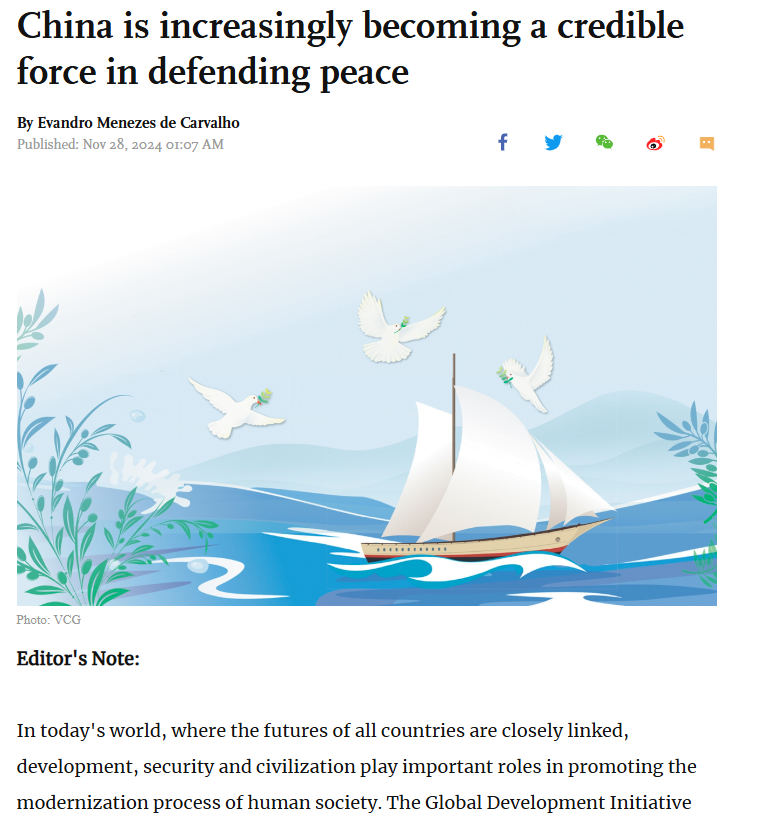LATEST INSIGHTS
Your Present Location: LATEST INSIGHTSEvandro Menezes de Carvalho: China is increasingly becoming a credible force in defending peace
Source: Global Times Published: 2024-11-28

By Evandro Menezes de Carvalho
In today's world, where the futures of all countries are closely linked, development, security and civilization play important roles in promoting the modernization process of human society. The Global Development Initiative (GDI), Global Security Initiative (GSI) and Global Civilization Initiative (GCI), proposed by Chinese President Xi Jinping, offer profound insights into the issues of our time. The Global Times invites scholars to provide readers both at home and abroad with an in-depth understanding of these three initiatives. This is the eighth article in the series.
China has developed a systemic, holistic and global foreign policy. This is due to several factors. First, China's significant participation in the world economy requires the country to have a broad and multidimensional vision of its international presence. Second, its responsibilities as a permanent member of the UN Security Council position it as an essential actor for the stability of the international order.
The world we live in today was unimaginable after the end of the Cold War. At the beginning of the 21st century, the war on terror followed by the US invasion of Iraq, with NATO support and without the Security Council's consent, was a sign that the institutional foundations of the post-World War II international order were showing very exposed cracks. The current conflict between Russia and Ukraine, with the US increasingly participating in authorizing Ukraine to use long-range missiles against Russia, could, if it escalates further, deal a heavy blow to the UN. The humanitarian crisis in Gaza and the West's complacent silence leave no doubt that private interests are prevailing over the interests of humanity. The crisis is not just one of multilateral diplomacy; it is one of leadership and values.
In this scenario, China's increasing commitment to peace is a vector of stability for the international order and hope for the world. China's mediation in the historic reconciliation between Iran and Saudi Arabia in March 2023, as well as the recent resolutions reached on issues concerning the border area between China and India, are examples of a foreign policy committed to peaceful conflict resolution and the elimination of tensions in the management of differences with other countries. China is increasingly becoming a credible force in defending peace.
President Xi proposed the Global Security Initiative (GSI) on April 21, 2022, with humanity's future, security and well-being in mind, which reinforces China's commitment to a stable world. The GSI aims to improve global security governance to eliminate the causes of international conflicts and better address global challenges such as terrorism, cybersecurity and biosecurity. The principle of the GSI is that "the security of one country should not come at the expense of that of others." This principle calls for active engagement by each country in conflict prevention. The responsibility for peace would not lie with just a few powerful countries over others but with everyone over everyone.
In this context, China has acted correctly in seeking the support of Global South countries for the cause of peace. To this end, China has sought to promote the GSI through forums, bilateral engagements and partnerships with countries in Africa, Latin America and Asia. The initiative aligns with other Chinese-led efforts, such as the Belt and Road Initiative and Global Development Initiative. After all, economic issues are increasingly linked to those of national defense and international security.
The GSI is a policy framework that promotes a new approach to international security based on multilateralism and cooperation. The GSI is neither exclusive nor intended to be an initiative against one country. Its conception is based on the Chinese tradition that we are all interconnected. Furthermore, it is based on a systemic conception of security to safeguard, for example, global food and energy security.
Furthermore, the GSI rejects bloc confrontation and zero-sum approaches. In this sense, it opposes the cold war mentality that tries to sell the world the mistaken idea that China threatens the global order. Well, it is not China but the US that has more than 750 military bases worldwide and has been involved, directly or indirectly, in several wars for decades. The facts speak for themselves.
I use the famous Chinese idiom "Zhi Lu Wei Ma" - "pointing to a deer and calling it a horse" to explain the underlying reasoning behind the cold war mentality. This idiom summarizes an account in Shiji, or the Records of the Grand Historian, written by Sima Qian. In an attempt to control the Qin government, Zhao Gao, an influential Chinese official under the second Qin emperor, wanted to increase his power and influence in the court. However, he was afraid that the other officials would not obey his orders. So, Zhao decided to test their loyalty. He brought a deer to the emperor, claiming it was a "horse." The emperor laughed and said that it was a deer. Zhao then asked the officials which animal he had brought. Those who wanted to please him said it was a horse. Those who said it was a deer were executed. Zhao gained more power.
Countries that try to propagate the cold war mentality to convince others that China is a "threat" to the world are acting like Zhao Gao. Everyone knows that China is not a threat to the world; everyone knows that the US is overusing its power and influence and that this behavior risks world peace.
It is time to counter false assumptions made by countries that claim to be committed to peace when they have always been clamoring for war. It is time to say that the deer is a deer, not a horse. It is time to defend the truth of the facts.























































































 京公网安备 11010802037854号
京公网安备 11010802037854号





